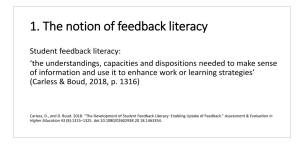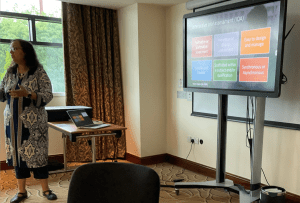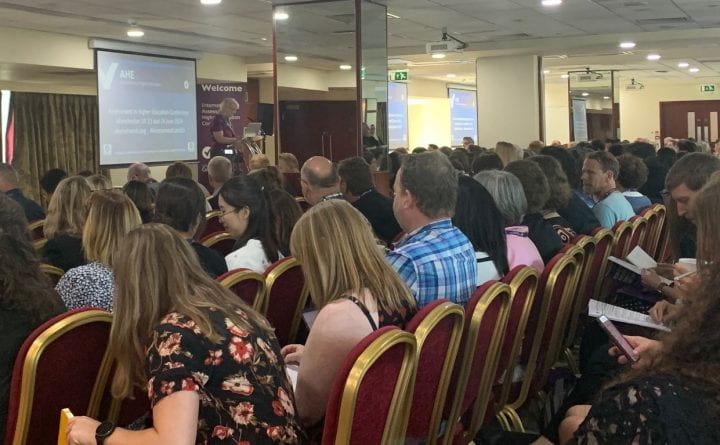With over 150 sessions and presentations to choose from at the Assessment in HE Conference I focussed on feedback and alternative assessments. Here are some of my highlights.
Feedback Literacy
I attended David Boud’s (Deakin University, Melbourne, Australia) Masterclass What do we as educators need to become feedback Literate. Boud outlined his ideas on feedback literacy. Essentially, feedback needs to be seen as an ongoing activity which is integral to the learning process. Feedback should not be viewed as an artefact but as something that needs to be designed into learning at determined points. It involves action or activity which happens before and after assessment. Feedback is currently a sort of ritual, given unsolicited and automatically at the end of learning, but feedback has a more potent effect before this point. For Boud, feedback which simply justifies a grade is not really feedback if it does not provide support for the future and lead to action.
For students to feel party to the feedback process, it can be helpful if they request the areas where they want feedback. I found it interesting that in standardised teaching, feedback is one of the few occasions where students receive an individual response and have the potential to respond themselves.
After completing an exercise to identify areas where feedback could be enhanced or changed at various levels, macro: design and development of entire programmes, meso: design and implementation of feedback processes in course modules/units and micro: feedback practices relating to individual student assignments, there followed discussions on ways to design and plan assessment feedback.

Peer feedback or the use of collaborative annotations was discussed as a good mechanism which allows students to acquire skills to be better learners and to understand grading as students often find it hard to deconstruct the language used in grade criteria and rubrics, which may not be specific to their discipline.
Students are more likely to engage with their own feedback if they have experience of writing feedback. This could be by students providing feedback, grading justification for discussion, or addressing how their submission responds to previous feedback comments. Many other suggestions were put forward: students using a portfolio tool as a reflective learning journal or students attempting to grade work without reference to criteria. This could be followed by discussing why they gave the grade, and then repeating the exercise with a criteria. Another suggestion was for teachers to provide example drafts so students can see the work that goes into producing the final work.
Some attendees wondered about the time involved in introducing and implementing these feedback strategies, but Boud pointed out that a lot of this can be done by students. Students themselves are an untapped resource. Having feedback frontloaded is more useful and means that final feedback at the pressure points can be streamlined to focus on grade justification, and only expanded where required or requested.
I attended a number of other sessions which looked in more detail at the implementation of alternative assessment and feedback.
Unscripted Oral Interviews
In the session Interactive Oral Assessment: Resolving tensions between formative and summative assessment, Amita Krautloher from Charles Stuart University, Australia outlined how useful the unscripted oral interviews are in assessing student’s progress and keeping them engaged throughout their learning.

Amita emphasised the unscripted nature of the oral interview, which allows questions to be re-phrased and steers the conversation back on track if required.
A rubric is used for each category – communication skills, theoretical knowledge, application etc.
The context for this assessment is engineering students on a one-year professional placement module. In this case, there are 4 main assessment points with tasks across the year. For the first pre-placement interview, students discuss their ideal job and their skills gap. This allows them to use the feedback received in the interview to create a learning plan for their placement. Subsequent interviews, together with the student’s reflective journals, eventually lead to the student creation of an ideal job advert for the post and responses to previous feedback.
Support is provided to students before the first interview to prepare them for the module: The academic is involved in a mock interview with students interviewing the academic. Students practice together in breakout rooms and access academic skills workshops such as time management and interview skills.
This example of authentic learning showcased well how using the unscripted oral assessment can be used for both formative and summative assessment or combined into one as is the case in this example. There were different ratings for each element. This assignment allows the student to demonstrate transferrable skills: professionalism, presentation, technical communication, problem-solving, thinking on your feet and interview preparation.
Student Produced Videos
In another session Dimitios Minos from Kings College London showed how he used Video assessment with audio feedback as an alternative to the traditional economics exam. The video format works well against collusion, and students develop other transferable skills such as communication, time management, and planning. In this example, Economics undergraduate students in large cohorts of 500-900 students produced a 3-5 min video to show and explain their mathematical solution. This was for a 50% weighted open book exam. The other 50% of the module was a traditional exam essay question.
Students received audio feedback. The audio feedback and marking took about 5 minutes per student and the results were in the expected range with the essay and video component results correlating.
Our own Isobel Bowditch presented for the Poster & Pitch ‘Exploring how you create an institutional environment which increases academic integrity’.
Earlier this year UCL’s Digital Assessment Team lead a cross-institutional project in collaboration with Student Changemakers, Arena and the Academic Communication Centre. This poster outlines how the workshops and focus groups were conducted and shares interesting findings and plans for next steps. Poster: ‘Academic Integrity – Student and Staff Perspectives’
